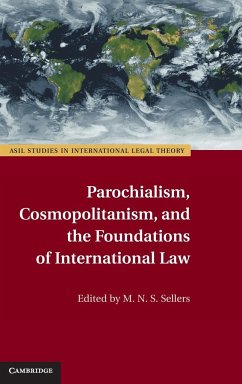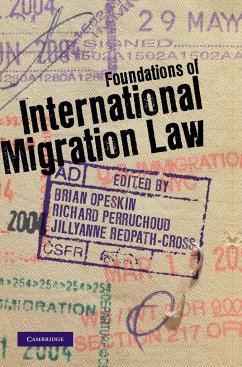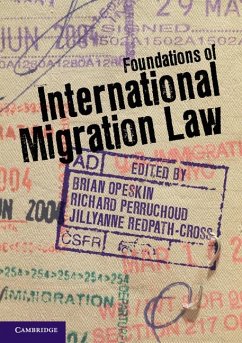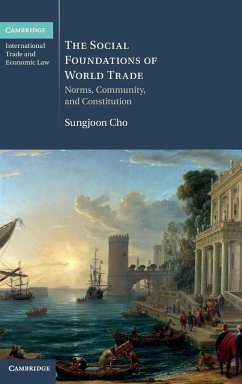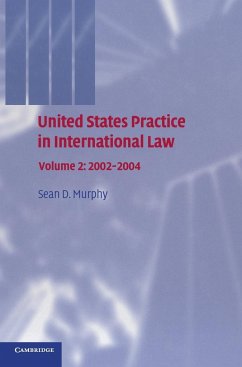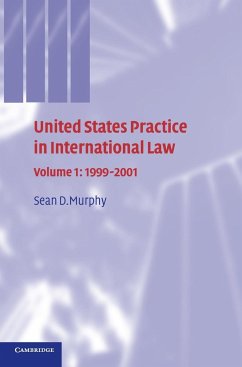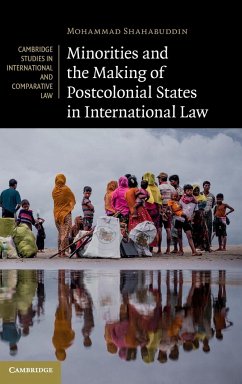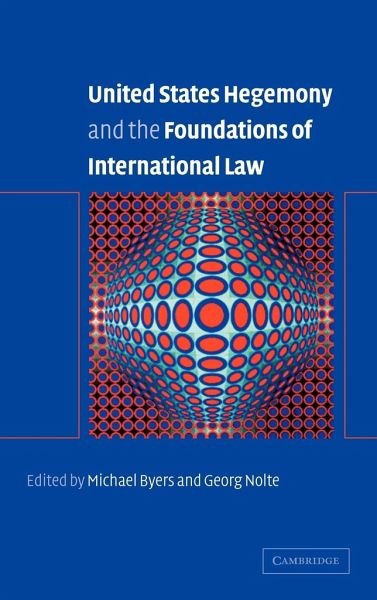
United States Hegemony and the Foundations of International Law

PAYBACK Punkte
77 °P sammeln!
Leading scholars consider the effect of US hegemony in the international legal system.Successive hegemonic powers have shaped the foundations of international law. This book examines whether the current predominance of the United States is leading to foundational change in the international legal system. A range of leading scholars in international law and international relations consider six foundational areas that could be undergoing change, including international community, sovereign equality, the law governing the use of force, and compliance. The authors demonstrate that the effects of U...
Leading scholars consider the effect of US hegemony in the international legal system.
Successive hegemonic powers have shaped the foundations of international law. This book examines whether the current predominance of the United States is leading to foundational change in the international legal system. A range of leading scholars in international law and international relations consider six foundational areas that could be undergoing change, including international community, sovereign equality, the law governing the use of force, and compliance. The authors demonstrate that the effects of US predominance on the foundations of international law are real, but also intensely complex. This complexity is due, in part, to a multitude of actors exercising influential roles. And it is also due to the continued vitality and remaining functionality of the international legal system itself. This system limits the influence of individual states, while stretching and bending in response to the changing geopolitics of our time.
Table of content:
Foreword Michael Byers and Georg Nolte; Introduction: The complexities of foundational change Michael Byers; Part I. International Community: 1. The international community, international law and the United States: three in one, two against one or one and the same? Edward Kwakwa; 2. The influence of the United States on the concept of the 'International Community' Andreas Paulus; Commentaries: Martti Koskenniemi, Volker Rittberger and Steven Ratner; Part II. Sovereign Equality: 3. Sovereign equality: the Wimbledon sails on Michel Cosnard; 4. More equal than the rest? Hierarchy, equality and US predominance in international law Nico Krisch; Commentaries: Pierre-Marie Dupuy, Matthias Herdegen and Gregory Fox; Part III. Use of Force: 5. The use of force by the United States after the end of the Cold War and its impact on international law Marcelo Kohen; 6. Bending the law, breaking it, or developing it? The United States and the humanitarian use of force in the post-Cold War era Brad Roth; Commentaries: Thomas Franck, Jochen Frowein and Daniel Thuerer; Part IV. Customary International Law: 7. Powerful but unpersuasive? The role of the USA in the evolution of customary international law Stephen Toope; 8. Hegemonic custom Achilles Skordas; Commentaries: Rainer Hofmann, Andrew Hurrell and Rüdiger Wolfrum; Part V. Law of Treaties: 9. The effects of US predominance on the elaboration of treaty regimes and on the evolution of the law of treaties Pierre Klein; 10. US reservations to human rights treaties: all for one and none for all? Catherine Redgwell; Commentaries: Jost Delbrueck, Alain Pellet and Bruno Simma; Part VI. Compliance: 11. Compliance: multilateral achievements and predominant powers Peter-Tobias Stoll; 12. The impact on international law of US non-compliance Shirley Scott; Commentaries: Vaughan Lowe, David Malone and Christian Tomuschat; Conclusion Georg Nolte.
Successive hegemonic powers have shaped the foundations of international law. This book examines whether the current predominance of the United States is leading to foundational change in the international legal system. A range of leading scholars in international law and international relations consider six foundational areas that could be undergoing change, including international community, sovereign equality, the law governing the use of force, and compliance. The authors demonstrate that the effects of US predominance on the foundations of international law are real, but also intensely complex. This complexity is due, in part, to a multitude of actors exercising influential roles. And it is also due to the continued vitality and remaining functionality of the international legal system itself. This system limits the influence of individual states, while stretching and bending in response to the changing geopolitics of our time.
Table of content:
Foreword Michael Byers and Georg Nolte; Introduction: The complexities of foundational change Michael Byers; Part I. International Community: 1. The international community, international law and the United States: three in one, two against one or one and the same? Edward Kwakwa; 2. The influence of the United States on the concept of the 'International Community' Andreas Paulus; Commentaries: Martti Koskenniemi, Volker Rittberger and Steven Ratner; Part II. Sovereign Equality: 3. Sovereign equality: the Wimbledon sails on Michel Cosnard; 4. More equal than the rest? Hierarchy, equality and US predominance in international law Nico Krisch; Commentaries: Pierre-Marie Dupuy, Matthias Herdegen and Gregory Fox; Part III. Use of Force: 5. The use of force by the United States after the end of the Cold War and its impact on international law Marcelo Kohen; 6. Bending the law, breaking it, or developing it? The United States and the humanitarian use of force in the post-Cold War era Brad Roth; Commentaries: Thomas Franck, Jochen Frowein and Daniel Thuerer; Part IV. Customary International Law: 7. Powerful but unpersuasive? The role of the USA in the evolution of customary international law Stephen Toope; 8. Hegemonic custom Achilles Skordas; Commentaries: Rainer Hofmann, Andrew Hurrell and Rüdiger Wolfrum; Part V. Law of Treaties: 9. The effects of US predominance on the elaboration of treaty regimes and on the evolution of the law of treaties Pierre Klein; 10. US reservations to human rights treaties: all for one and none for all? Catherine Redgwell; Commentaries: Jost Delbrueck, Alain Pellet and Bruno Simma; Part VI. Compliance: 11. Compliance: multilateral achievements and predominant powers Peter-Tobias Stoll; 12. The impact on international law of US non-compliance Shirley Scott; Commentaries: Vaughan Lowe, David Malone and Christian Tomuschat; Conclusion Georg Nolte.





